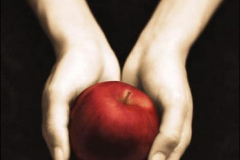I haven’t read Stephenie Meyer’s Breaking Dawn. I read Twilight and while I like cotton candy, I can only take so much. Like, one cone every 10 years or so or.
By now I’m sure everyone’s heard about the backlash against what is reputed to be the shoddy workmanship of Breaking Dawn and the push to return it to the bookstores after having read it. Mind you, the complaints ranged from the fact that Meyer tore her own world’s rules asunder to the poor editing job (i.e., grammar, spelling, typos). I found more than a few of those in Twilight and it bugged me then that a major publisher would release it like that. It looked so [sneer] vanity published.
I’ve heard ad nauseam about the gatekeepers, the agents and the editors, whose self-appointed Prime Directive is to keep out the unwashed masses of illiteracy who think they have a bestseller in them somewhere. They are there to not only 1) screen out the dreck and vet work that is potentially money-making, but once that is finished, to 2) put out a product that is well edited, well designed, and doesn’t look like it’s [sneer] vanity published.
Well, with Twilight, they did the first part right: They found a piece that would make money.
With the second part, they dropped the ball (especially with regard to Breaking Dawn) and Meyer ended up being put on the spot for a) bad writing, b) violation of her world’s rules, and c) bad editing in all stages.
I think that’s totally unfair.
I’ve been thinking about one particular Breaking Dawn post/thread on Dear Author for over a month now, wherein the commonly held die-hard fan opinion [that Meyer wrote by whimsy alone (putting forethought and craft aside)] was reiterated by author K.Z. Snow:
What’s so irksome is this: Meyer seemed to have a serious–and, to me, really appalling–lack of commitment to and respect for the craft. So shoot me for idealizing what we do, but one doesn’t become a writer on a freakin’ whim. I’m not surprised there’s been a degeneration from one book to the next.
and I opined:
I think this is clearly a case of wringing blood out of a turnip by the publisher and editors. They’re the ones who control the channel to the marketplace. If Meyer doesn’t have a commitment to the craft, who’s to blame? Meyer? No. The publisher and editors who facilitated her in that. If she has any thought about “craft” at all, I’d be surprised–and that’s not her fault. She hasn’t been required to to sell a gazillion+1 books.
Nora Roberts disagreed with me:
Yes, it is. Her name’s on the book. It’s her work. […] But it is the author who’s responsible for what’s on the page.
And this comment is what’s had me thinking about this for so long after it’s been done and gone.
Ms. Roberts’s comment is borne out in the fact that Meyer alone was held accountable for what’s widely perceived as shoddy workmanship. Do we know who her editors (content, line, and copy) are? Undoubtedly somebody does, but they aren’t the ones being burned in effigy. I wonder if they got dragged into a meeting to find out why so many die-hard fans took their books back? I wonder if they got sent to Remedial Editing? I wonder if Meyer went back and said, “Hey, why didn’t you do your job? You made me look bad and you’re supposed to make me look good. You’re the gatekeepers.”
She was also responsible for selling those gazillion+1 books and making a helluva lot of money for those gatekeepers, whimsy and shoddy workmanship and all.
Yet why should Meyer bear sole responsibility for what is obviously a case of “Bless her heart. It ain’ her fault; she doan know no better”? Moreover, she doesn’t know she “doan know no better” as evidenced by the fact that she’s trying to defend the book by blaming readers. “They just didn’t get it.” Well, maybe they didn’t, but you don’t say that in public. If you can’t keep from digging yourself into a hole, shut the hell up.
(And ahem, Stephenie. You’re college educated. Could you not have gone through your manuscript to make sure you caught all the typos? Oh, right. That was the copy editor’s job, wasn’t it?)
Meyer’s editors, in looking for a quick buck sooner rather than later, threw Meyer to the wolves. They, as the self-appointed gatekeepers should have done their jobs and when they didn’t, they let her take the fall because, as Ms. Roberts points out, it’s her name on the book.
They also threw the readers and die-hard fans to the wolves—who howled loud, long, and with their checkbooks. Who knows how many die-hard fans felt betrayed who did not take their books back and did not burn them (as some did)?
I have come to no conclusion except that, at this point, I think both Ms. Roberts and I are right. But how can that be? I don’t know, because obviously Meyer was held accountable for it, but she wasn’t the one who enthusiastically put it in the editorial pipeline. I can’t think she had much control over it after that other than galley proofs.
Right now, though, I only have two questions:
- What, again, are the gatekeepers for?
- How did such work warrant such gorgeous covers?





I read the entire Twilight series. It was okay. I’ve read much worse. Even Breaking Dawn was satisfactory to me. (But yes, it should have been better edited. And it’s not always the author who creates the typos. Sometimes it’s editing and/or typesetting.)
The thing I don’t get is why people are so upset that Meyer is just an adequate story teller. She never really claimed to be a great writer. The books are what they are–light, fluffy entertainment. And as such, they do what they were intended to do. I kept my copy.
Hi, Karlene!
I understand that, but I haven’t seen as many typos in other widely published books as I did Twilight, so someone dropped the ball.
And apparently, the “defective product” claims over Breaking Dawn (by the fans) did pertain to the quality of the editing and proofreading.
I’m not upset she’s just an adequate storyteller (to me, Twilight read like I was watching a movie), although I do think it’s a bad example to point to for authors to say, “See? You too can send adequate work to an agent and get picked up and contracted in six months.”
My discomfort comes from a Mormon point of view–which, well, you’re LDS so I hope you understand–which is that she wrote subtext I don’t believe she understands, much less that she wrote it. However, the inadequate editing and proofreading certainly did not sit well with me.
What I’m trying to say (inadequately) is that she’s getting blamed for a lot of problems that she shouldn’t be getting blamed for.
A good comparison is movie making, where the writer, director, editors (film, sound, etc.) and actors are acknowledged separately. You can’t blame lousy acting or sound design on the writer.
I also think that people don’t understand how difficult it is to edit your own work, especially 100,000-plus words of it. You get so immersed in it that your mind tunes out the errors. (Text-to-speech software helps a lot in this regard.) Chris at Zarahemla did a great job copyediting Angel Falling Softly (I’ve only found a couple obscure usage errors on subsequent re-readings), meaning he had several people besides himself do multiple editing passes. It’s a laborious, time-consuming process.
Another reason to love ebooks is that typos are so fixable. Even Amazon will update a revised Kindle ebook in less than 48 hours.
In this case, I would blame the corporate bottom line (quick, cash in while we can!) and the inability to properly exploit modern technology, which pushed the editing process past deadline. How hard or expensive would it be to grab half a dozen interns, teach them how to use the Word comment feature, and let them have at the MS?
I had a job proofing engineering specs that were also legal documents and had to be flawless. We proofed in pairs. One read aloud, the other followed along. With regard to the intern comment, how hard would that be, either?
I’ve had freelance jobs doing document design and proofreading, and I rope Dude into proofing as a team this way.
Mmmm, I don’t know. Showgirls was pretty universal in blech. Hard to know who to blame most for that.
Newspapers, too, though. One semester I was copyeditor for the school rag (J major here) and none of my edits got done before the paper was put to bed. My advisor had my name taken off the masthead because it would have made me look very bad when I had, in fact, done the work.
You know what’s so insane about that is that they didn’t have to. The fans would have waited. Die-hard fans will ALWAYS wait if you’re honest with them. Just say, “Hey, we want to give you the best bang for your buck; can you wait another six months?”
.
I keep trying to get myself to read them. This isn’t helping.
I completely agree on the whole “wringing blood out of a turnip” point. If respect for the craft isn’t what the publisher is looking for (or it isn’t a high priority), why should they expect that’s what they’ll get?
Really, I think most of the Harry Potter series would have been better with more aggressive editing, but who’s going to second-guess the goose who laid the golden egg?
Indeed, and I think what rankles is that savvy unpubbed authors are going to workshops and reading blogs and books, being told at every turn, “Polish, polish, polish, even if you have to hire an editor to help you, because that’ll put you ahead of the game.”
And after all that, Little, Brown couldn’t be bothered to do the same?
Which brings to mind the joke: What do you have to do to make a small fortune in publishing? Spend a large fortune.
I like epic-length books and Harry Potter hit the spot for me (at least until #7–still don’t know what happened there). But you notice that without respect to the writing, the books themselves are works of art, outside AND inside. The interior design is simply magnificent. And not a typo to be had.
I think Little, Brown had a responsibility to the Twilight books that they didn’t fulfill. And–my whole point, really–they let Meyer take the fall for it. I personally think she should have refused interviews and told reporters to go talk to her editors.
True, the Harry Potter books were very beautifully put together (the U.S. edition anyway — the U.K. edition wasn’t nearly as attractive).
I wasn’t that impressed with the covers of the Twilight series, though. Sure they’re professional, but they seem (to my taste) kind of boring and unoriginal. They certainly don’t make me say “Wow, this looks like an interesting book to read!” When I went to the bookstore to buy Twilight (before I knew what the cover looked like), I actually walked past a display of them on the first pass without noticing them.
.
Really! I found them very striking. I was aware of the covers before I had any idea what the books were.
I love the double standard when it comes to the gatekeepers. Exactly what are they keeping in, or out, when such crap gets published?
I think the other problem is the fact that a lot of publishers want authors to crank out 2 or 3 books a year.
For most writers, you either get “fast” or you get “quality.” You don’t normally find both in most writers.
The publishing industry has (to quote Doc Turtle) “the turning radius of the QE2.” Worse, they don’t want to turn around.
All you have to do to see where it’s going is look at the record companies and how music is being disseminated now.
Hey MoJo, very true. So many indies are making this record industry = publishing industry connection. And the publishing industry has always been more slow and resistant to change than the record industry.
This is like hanging around on the Titanic while it’s going down, in case the band plays something good.
Traditional publishing isn’t going away, and that’s GOOD. What’s going to have to happen is a different model of distribution, i.e., not the old consignment model that masquerades as a wholesale model.
With regard to print, people are always going to want print books. I like print books, although lately I’d rather have them for decoration than reading because I’ve gotten spoilt by my ebook reader (the ergonomics are divine and the backlight–scrumptious).
With regard to ebooks, publishing’s just going to have to embrace it and not go the way of the music biz in its efforts to kill piracy by way of DRM.
However, if the gatekeepers are only going to continue to feed trends instead of create them, if they’re not going to put out a product that’s superior than what an indie can do himself, then no, I don’t see the point of the gatekeepers.